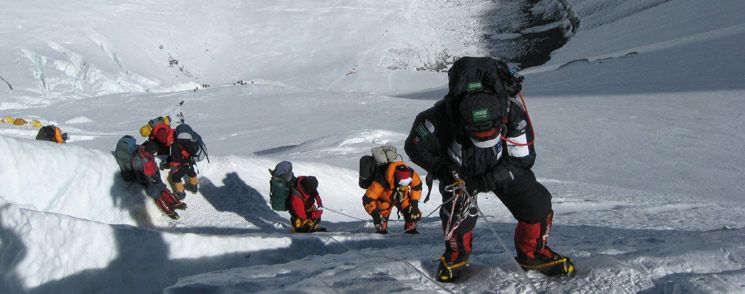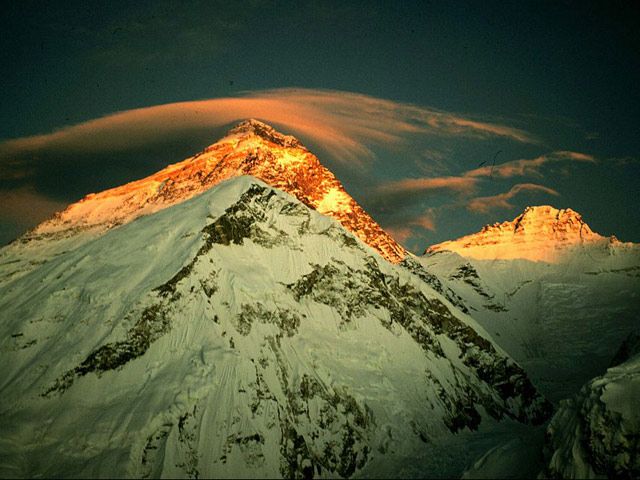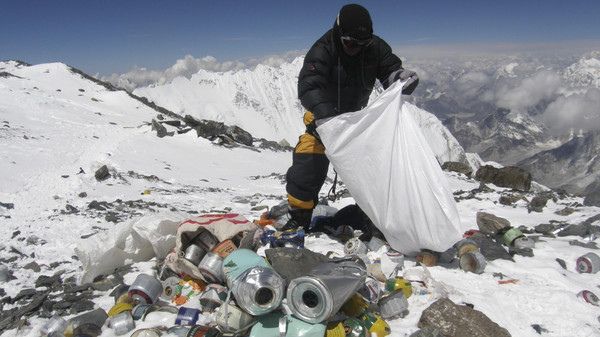Piolets d'Or Announces the "Significant Ascents" of 2023
This list of 68 climbs is effectively a "long list" used to select nominees of the prestigious alpine award.


The Nepal government is in damage control one year after an infamous high-altitude brawl between leading European climbers and Sherpa guides on Everest. The authorities have now placed a security picket at the Base Camp of the 8000er. It also substantially reduced the climbing fee for individuals for the 2014 season.
Nepal Tourism police personnel will be stationed at the Everest Base Camp (17,598 ft) so climbers or Sherpa's can approach the authorities "if there are any issues" on the world's highest mountain, senior tourism official Madhusudhan Burlakoti said Monday.Image © commons.wikimedia.orgThe stationing of security personnel comes after the fight (near Camp 2 at 23,000 ft) last April made global headlines and shocked the mountaineering community. The unruly incident reignited the debate on crowding on the 'roof of the world' as also brought out issues like climbing rights and underlying tensions involving climbing styles adopted in the mountains of Europe and Asia.

The idea is to make things easy for climbers. Presently, a liaison officer from the army, police force or tourism ministry is assigned to each group of mountaineers during the peak climbing months of April and May.
Under the new set up in April, climbers will have faster, easier access to officers for any sort of assistance rather than depending on a single-assigned liaison officer, he added.
The argument between the Europeans and the laborious local guides broke out when the Nepalese asked the mountaineers to stay at Base Camp while they fixed the ropes on the Kumbhu Ice fall section (17,999 ft) on the slopes of Everest on the South Col route, which is the traditional practice.
Matters got violent when the Europeans refused to comply saying the decision on their climb and ascend could not be determined by the Sherpas. The two groups later apologized said they regretted the incident.
In the other move to further traffic on Everest, Nepal Tourism slashed individual climbing fees on the top mountain and other Himalayan peaks to USD 11,000 from USD 25,000.
Everest is the key revenue earner for the impoverished country, with hundreds attempting to scale the mountain every year. "Large groups get discounted rates, with a group of seven paying $70,000. The discount encourages climbers to team up even if they have vastly different experience and barely know each other, Burlakoti said.
The high price-tag associated with climbing Everest has been talked about the by the mountaineering community with some arguing that prices allow only the very rich to climb the peak. Environmentalists, on the other hand are concerned about the strain tourism puts on the mountain.
Taking serious note of the death of a Belgian woman trekker on June 14 2013 near a hiking trail in the Langtang National Park and other incidents of assaults, the Nepal government has made it mandatory for solo-trekkers to be accompanied by at least one registered guide or porter.
The decision was taken by the Ministry of Home Affairs and has been welcomed by the Trekking Agencies Association of Nepal (TAAN), which says it will help ensure the safety of tourists and put a plug on illegal trekking operators.
Mohan Lamsal, General Secretary, TAAN said, “The decision will help promote Nepal as a safe destination for tourists at a time when international media is questioning the safety of foreigners.”
The new policy will involve an additional fee of $10 per day for Free Individual Trekkers (FIT).
The government also plans to increase it's monitoring on climbers to ensure they bring down all their climbing gear, food wrapping and oxygen cylinders -- after littering on Everest in it's 60 year old climbing history. This has given it the oft-mentioned deleterious title of the 'world's highest dump'.

In a stringent measure to clean up the slopes of Everest, the government is telling each trekker to return with eight kilograms of garbage, in addition to their own. Those who do not comply will face penalties and the possibility of a ban on future ascents.
"I have seen this trash… it's ugly and everywhere," said Everest's record summiteer Apa Sherpa.
Hundreds attempt and many summit Everest annually; more than 600 people received permits in 2013.
"If, like last year, 600 climbers ascend Everest, and each brings back eight kilograms, it would add up to about six tonnes this year. Going by that, if the number of climbers stays steady at 600 annually, it will take more than eight years to clean all the trash from our great mountain," Apa, nicknamed 'Super Sherpa' for his 21 summits, said.
Place: New Delhi
2nd best newsletter in the universe